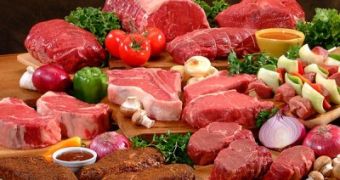Earlier today, we talked about how The World Bank just announced that food prices for July have increased by as much as 10% when compared to the previous month.
As explained, this was due to the fact that climate change has brought about a series of changes in environmental conditions, which in turn have affected agricultural practices on a global scale.
Other scientists now ring the alarm with respect to how these phenomena will impact on our dietary habits.
Apparently, recent studies have shown that, given the improper management of existing water resources, and also taking into consideration the fact that bountiful crops are ever more tricky in obtaining, it may very well be that soon enough we will not be able to grow animals for food.
Rumor has it that said “soon enough” will be sometime around the year 2050, so the case is now made that people need to learn to gradually let go of meat and turn towards fruits and vegetables instead.
Life's Little Mysteries quotes a report recently made public by specialists working with the Stockholm International Institute, in which it is stated that, “There will not be enough water available to produce food for the expected 9 billion population in 2050 if we follow current trends.”
Backing up this claim, one other researcher supposedly made a case of how, “Producing food requires more water than any other human activity – and meat production is very water-intensive.”
“We might go back to when Sunday night dinner was [the only time] when you had a chicken on the table,” argues one other specialist who looked into this issue.
Truth be told, they might actually be right, seeing how tremendous amounts of resources need be used by farmers on a yearly basis in order to raise the cattle or the poultry we enjoy eating on a regular basis.
Thus, there are some who claim that a cow eats 17 times more grain calories than it gives back once it ends up on our plates, so speaking strictly from a financial standpoint, the arguments brought forth by these researchers seem to us quite compelling ones.
Down below you have a video released quite a while back by the World Wildlife Fund as part of their “Change the Way You Think About Everything Campaign” which pretty much summarizes the points made in this article.

 14 DAY TRIAL //
14 DAY TRIAL // 